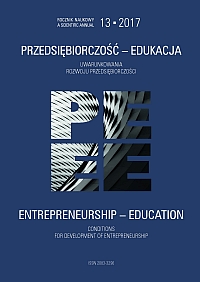Academic Entrepreneurship and Innovation in Poland
DOI:
https://doi.org/10.24917/20833296.13.13Keywords:
academic innovation, entrepreneurial university, entrepreneurship spin-off enterprises, startupsAbstract
The aim of changes in the structure of higher education in Poland should be encouraging competitiveness processes, and the essence of changes is creating an entrepreneurial university. The creation of an entrepreneurial university gives the academic community the possibility of commercialisation of research. Without a significant increase in innovation, academic entrepreneurship will be trapped in stagnation. Focusing academic entrepreneurship on innovation is a very difficult task, because the academic environment is characterised by a very low level of entrepreneurship. Changes in the functioning of institutions of higher education in Poland occur at a slow pace and are even further delayed by the traditional bureaucratic structure of the university, the university authorities reluctance to use flexible methods of management, lack of market instruments to support academic entrepreneurship. A tool for stimulating academic entrepreneurship is to create conditions for the development and support of innovative spin-off and spin-out business. Innovative academic enterprises require significant capital investment whose return is burdened with very high risk. This is one of the reasons for the slowdown of the process of innovation development of academia. The main aim of the study is to assess the level of university management effectiveness by showing how the highest value of the university, its employees, students, graduates and their knowledge, is better than ever before. In order to ensure proper fulfillment of the main objective, specific objectives have also been formulated. Implementing the objectives of the study requires addressing several research problems. The main problem is to assess the level of organizational efficiency of universities by comparing to the best (benchmarking results). This involves creating a model for managing the university and determining what dimensions and criteria should be created for a model that evaluates organisational effectiveness. Key factors in organisational effectiveness (cost and financial) had to be defined. It is also important to evaluate the effectiveness of the organisation and the criteria adopted for the evaluation of organisational effectiveness.References
Andrzejczak, A. (2015). Uniwersytet przedsiębiorczy i odpowiedzialny społecznie. Edukacja Ekonomistów i Menadżerów, 4(38).
Clark, B.R. (1998). Creating Entrepreneurial Universities: Organizational Pathways of Transformation. Oxford: Pergamon, For IAU Press.
Dec, D. (2011). Firmy typu spin-off i spin-out. Poradnik dla osób chcących założyć działalność gospodarczą. Szczecin.
Dec, D. (2016, 1 listopada). Od pomysłu do zysku – czyli spin-off/spin-out w teorii i praktyce. Pozyskano z: http://webcache.googleusercontent.com/search?q=cache:9SWGhbbtkPwJ:kreatywnyprzed-siebiorca.vizja.pl/pl/pobierz-plik/id/13+&cd=1&hl=pl&ct=clnk&gl=pl&client=firefox-b-ab
Dudzikowa, M. (2012). Sytuacja problematyczna interdyscyplinarności w naukach społecznych i humanistycznych (z kryzysem w tle). W: A. Chmielewski, M. Dudzikowa, A. Grobler (red.),Interdyscyplinarnie o interdyscyplinarności. Między ideą a praktyką. Kraków: Impuls, 15-38.
Enders, J., Musselin, CH. (2008). Back to the future? the academic professions in the 21 st century, OECD:Higher Education to 2030, Vol. 1: Demography.
Giełzak, M. (2016, 1 listopada). Źródła finansowania startupów. Pozyskano z: http://mamstartup.pl/in-westycje/9793/zrodla-finansowania-startupow-wprowadzenie.
Leja, K. (2011). Koncepcje zarządzania współczesnym uniwersytetem. Gdańsk: Wydawnictwo Politechniki Gdańskiej.
Mańka, M. (2016, 18 października). Samoregulacja motywacji. Pozyskano z: http://www.treco.pl/wiedza/artykuly-szczegoly/id/706/page/75/samoregulacja motywacji/
Makieła, Z. (2016). The Network Structure: the Menegement Infrastructure of an Innovative City and Region. W: J. Kaczmarek, K. Żmija (red.), Expectations and Challenges of Modern Economy and Enterprises. Problems-Concepts-Actvities. Cracow: Cracow University of Economics, Fundation of the Cracow University of Economics.
Makieła, Z. (2016). Instrumenty wsparcia przedsiębiorczości akademickiej. W: J. Kaczmarek, P. Litwa (red.),Procesy rozwoju przedsiębiortsw w konkurencyjnym i innowacyjnym otoczeniu . Kraków: Uniwersytet Ekonomiczny w Krakowie, Fundacja Uniwersytetu Ekonomicznego.
Markowski, M.P. (1997). Efekt inskrypcji. Jacques Derrika i literatura. Bydgoszcz : Wydawnictwo Homini.
Poznańska, K. (2014). Przedsiębiorczość akademicka – cechy i znaczenie w gospodarce światowej i polskiej. W: T. Kraśnicka (red.), Innowacyjność współczesnych organizacji. Kierunki i wyniki badań, część II. Katowice: Uniwersytet Ekonomiczny w Katowicach.
Richert-Kazimierska, A. (2010). Instytucjonalne formy wsparcia przedsiębiorczości akademickiej w Polsce. eMentor, 3(35).
Strużycki, M., (2002). (red.). Zarządzanie małym i średnim przedsiębiorstwem. Uwarunkowania europejskie. Warszawa: Wydawnictwo Diffin.
Szałucki, K. (2012). Przedsiębiorstwa transportowe. Warunki i mechanizmy równowagi. Gdańsk: Wydawnictwo Uniwersytetu Gdańskiego.
Tamowicz, P. (2006). Przedsiębiorczość akademicka: spółki spin-off w Polsce. Warszawa: Agencja Rozwoju Przedsiębiorczości.
Turek, A. (2016, 1 listopada). Jak sprzedać patent i dobrze zarobić. Pozyskano z: http://innpoland.pl/113887,problemy-zpatentami
Wawak, T. (2012). Jakość zarządzania w szkołach wyższych. Kraków: Wydawnictwo Uniwersytetu Jagiellońskiego.
Wawak, T. (2017). Zarządzanie w szkołach wyższych i innowacje w gospodarce. Kraków: Wydawnictwo Uniwersytetu Jagiellońskiego.
Wisseman, J.G. (2005). Technostarterzy – dlaczego i jak. Warszawa: PARP.
Downloads
Published
How to Cite
Issue
Section
License
Articles are published under the terms of the Creative Commons License (CC BY-ND 4.0; Attribution– NoDerivs).

